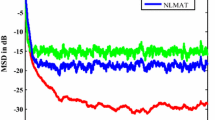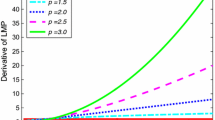Abstract
In this paper, we propose an efficient design of optimum error nonlinearities (OENL) for adaptive filters which minimizes the steady-state excess mean square error and attains the limit mandated by the Cramer–Rao bound (CRB) of the underlying estimation process. Novelty of the work resides in the fact that the proposed improved optimum error nonlinearities (IOENL) design incorporates the effect of CRB which was ignored in the existing literature. To achieve this, we employ two efficient methods to estimate the variance of a priori estimation error. Therefore, the proposed IOENL does not use any assumption on the distribution of input regressor elements and noise sequence. Neither the assumption of independence on the input regressor is made nor any sort of linearization is assumed. Extensive simulations are done to show the efficiency of the proposed algorithm compared to the standard least mean square algorithm and the standard OENL algorithm.




Similar content being viewed by others
References
T. Aboulnasr, K. Mayyas, A robust variable step-size LMS type algorithm: analysis and simulation. IEEE Trans. Signal Process. 45, 631–639 (1997)
T. Aboulnasr, A. Zerguine, Variable weight mixed-norm LMS-LMF adaptive algorithm. IEEE Conf. Signals Syst. Comput. 1, 791–794 (1999)
T.Y. Al-Naffouri, A.H. Sayed, Optimum error nonlinearities for long adaptive filters, in IEEE International Conference on Acoustic, Speech, and Signal Processing (ICASSP),Orlando, USA (2002)
T.Y. Al-Naffouri, A.H. Sayed, Transient analysis of adaptive filters with error nonlinearities. IEEE Trans. Signal Process. 51(3), 653–663 (2003)
T.Y. Al-Naffouri, A.H. Sayed, Transient analysis of data-normalized adaptive filters. IEEE Trans. Signal Process. 51, 639–652 (2003)
T.Y. Al-Naffouri, A.H. Sayed, T. Kailath, On the selection of optimal nonlinearities for stochastic gradient adaptive algorithms, in IEEE International Conference on Acoustic, Speech, and Signal Processing (ICASSP), Istanbul, Turkey, vol 1 (2000), pp. 464–467
M. Arif, I. Naseem, M. Moinuddin, U.M. Al-Saggaf, Design of optimum error nonlinearity for channel estimation in the presence of class-a impulsive noise, in 6th International Conference on Intelligent and Advance System (ICIAS2016)
N.J. Bershad, On error-saturation nonlinearities in LMS adaptation. IEEE Trans. Acoust. Speech Signal Process. 36(4), 440–452 (1988)
N.J. Bershad, M. Bonnet, Saturation effects in LMS adaptive echo cancellation for binary data. IEEE Trans. Acoust. Speech Signal Process. 38, 1687–1696 (1990)
P. Bouboulis, S. Theodoridis, The complex Gaussian Kernel LMS algorithm, in International Conference on Artificial Neural Networks (ICANN) (2010), pp. 11–20
P. Bouboulis, S. Theodoridis, Extension of Wirtingers calculus to reproducing kernel Hilbert spaces and the complex kernel LMS. IEEE Trans. Signal Process. 59(3), 964–978 (2011)
J.A. Chambers, O. Tanrikulu, A.G. Constantinides, Least mean mixed-norm adaptive filtering. Electron. Lett. 30(19), 1574–1575 (1994)
Y.R. Chien, W.J. Tseng, Switching-based variable step-size approach for partial update LMS algorithms. Electron. Lett. 9(17), 1081–1083 (2013)
T. Claasen, W. Mecklenbr, Comparison of the convergence of two algorithms for adaptive fir digital filters. IEEE Trans. Circuits Syst. 28(6), 510–518 (1981)
C. Cowan, P. Grant, Adaptive Filters (Prentice Hall, Englewood Cliffs, 1985)
S. Douglas, T. Meng, Stochastic gradient adaptation under general error criteria. IEEE Trans. Signal Process. 42(6), 1352–1365 (1994)
D.L. Duttweiler, Adaptive filter performance with nonlinearities in the correlation multiplier. IEEE Trans. Acoust. Speech Signal Process. 30(4), 578–586 (1982)
E. Eweda, Comparison of RLS, LMS, and sign algorithms for tracking randomly time-varying channels. IEEE Trans. Signal Process. 42, 2937–2944 (1994)
W.A. Gardner, Learning characteristic of stochastic-descent algorithms: a general study, analysis, and critique. Signal Process. 6(2), 113–133 (1984)
J. Gibson, S. Gray, MVSE adaptive filtering subject to a constraint on MSE. IEEE Trans. Circuits Syst. 35(5), 603–608 (1988)
R. Gitlin, H. Meadors, S. Weinstein, The tap-leakage algorithm: an algorithm for the stable operation of a digitally implemented, fractionally spaced adaptive equalizer. Bell Syst. Tech. J. 61, 1817–1839 (1982)
I.S. Gradshteyn, I.M. Ryzhik, Table of Integral, Series, and Products, Corrected and Enlarged Edition (Academic Press, INC, New York, 1980)
R.W. Harris, D. Chabries, F.A. Bishop, A variable stepsize (vs) algorithm. IEEETrans. Acoust. Speech Signal Process. 34, 499–510 (1986)
S. Haykin, Adaptive Filter Theory (Prentice Hall, Englewood Cliffs, 1996)
S. Koike, Convergence analysis of a data echo canceler with a stochastic gradient adaptive fir filter using the sign algorithm. IEEE Trans. Signal Process. 43(12), 2852–2861 (1995)
R.H. Kwong, E.W. Johnston, A variable stepsize LMS algorithm. IEEE Trans. Signal Process. 40, 1633–1642 (1992)
W. Liu, J.C. Principe, S. Haykin, Kernel Adaptive Filtering : A Comprehensive Introduction (Wiley, New Jersey, 2010)
V. Mathews, S. Cho, Improved convergence analysis of stochastic gradient adaptive filters using the sign algorithm. IEEE Trans. Acoust. Speech Signal Process. 35(4), 450–454 (1987)
V.J. Methews, Z. **e, A stochastic gradient adaptive filter with gradient adaptive step size. IEEE Trans. Signal Process. 41, 2075–2087 (1993)
M. Moinuddin, A. Zerguine, A.U.H. Sheikh, Multiple access interference plus noise constrained least mean square (MNCLMS) algorithm for CDMA systems. IEEE Trans. Circuit Syst. 55(9), 2870–2883 (2008)
J. Nagumo, A. Noda, A learning method for system identification. IEEE Trans. Autom. Control AC–12, 282–287 (1967)
K. Ozeki, T. Umeda, An adaptive filtering algorithm using an orthogonal projection to an affine subspace and its properties. IEICE Trans. Jpn. J67–A, 126–132 (1984)
A.H. Sayed, Fundamentals of Adaptive Filtering (Wiley, New Jersey, 2008)
A.H. Sayed, M. Rupp, Robustness Issues in Adaptive Filtering, DSP Handbook (CRC Press, Boca Raton, 1998)
W.A. Sethares, Adaptive algorithms with nonlinear data and error functions. IEEE Trans. Signal Process. 40(9), 2199–2206 (1992)
T.J. Shan, T. Kailath, Adaptive algorithms with an automatic gain control feature. IEEE Trans. Acoust. Speech Signal Process. 35, 122–127 (1988)
E. Walach, B. Widrow, The least mean fourth (LMF) adaptive algorithm and its family. IEEE Trans. Inf. Theory 30(2), 275–283 (1984)
Y. Wei, S.B. Gefand, J.V. Krogmeier, Noise constrained least mean squares algorithm. IEEE Trans. Signal Process. 49, 1961–1970 (2010)
Acknowledgements
This project was funded by the Center of Excellence in Intelligent Engineering Systems (CEIES), King Abdulaziz University, under grant No. (CEIES-18-04-01). The authors, therefore, acknowledge the technical and financial support of CEIES. The authors also acknowledge the support of Karachi Institute of Economics and Technology (PAF-KIET) Pakistan in facilitating this research.
Author information
Authors and Affiliations
Corresponding author
Additional information
Publisher's Note
Springer Nature remains neutral with regard to jurisdictional claims in published maps and institutional affiliations.
Rights and permissions
About this article
Cite this article
Arif, M., Naseem, I., Moinuddin, M. et al. Improved Optimum Error Nonlinearities Using Cramer–Rao Bound Estimation. Circuits Syst Signal Process 38, 5169–5186 (2019). https://doi.org/10.1007/s00034-019-01114-0
Received:
Revised:
Accepted:
Published:
Issue Date:
DOI: https://doi.org/10.1007/s00034-019-01114-0




